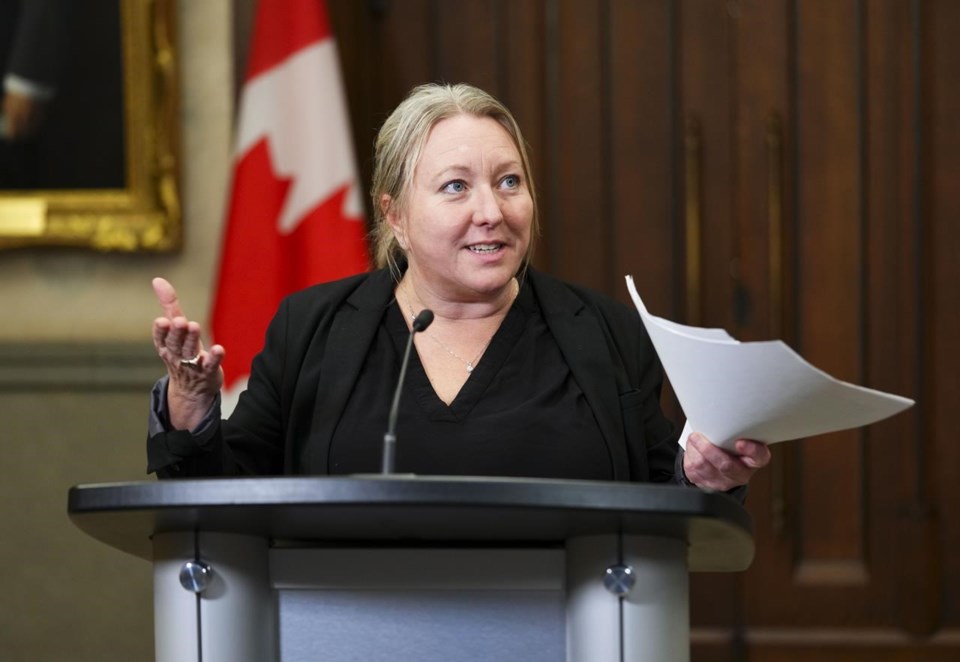OTTAWA — The holidays are already stressful enough and for Tania Marcil spare moments are hard come to by with Christmas weekend creeping up.
Now, instead of using those rare moments to get ready for the season, she says she is spending them scrambling to find last-minute care for her three children.
The Halifax-based worker is among the public servants who received a controversial back-to-the-office order last week. Federal employees will be required to spend two or three days a week at the office by March, with a transition beginning in mid-January.
Experts suggest Marcil is not alone in facing child-care hurdles before a return to in-person work.
Marcil has two kids in elementary school and a third in pre-school. She said she and her husband lived in Gatineau, Que., across the river from Ottawa, for their whole lives. But during the pandemic, her husband got a job opportunity in Halifax and the family was able to move due to her government work becoming fully remote.
The department Marcil works for has an office in Halifax, and she's been given the go-ahead to work there twice a week under the new requirements.
But ahead of that, she says she is struggling to get her children into before- and after-school programs.
"I've been informed that there's a possibility of a spot opening for one child," she said about one program's waitlist. However, she said, that same "possibility" was communicated last year without a spot becoming available.
Another issue Marcil said she's running into is that many child-care providers only seem to offer full-time care — at a full-time cost — when she would only need their services two days a week. She said she doesn't know of any places that offer part-time care.
That raised another question in Marcil's mind. "I didn't really consider that with us taking potentially one or two days a week, we might be blocking access to somebody who actually needs it on a more consistent basis," she said.
Child care across Canada has been sparse, said Marni Flaherty, the interim CEO of the Canadian Child Care Federation. A national child-care strategy is in place with the funding to back it up, she said, but the demand for care is putting even more pressure on a strained industry.
For federal public servants, it's going to a challenge to find a spot, said Flaherty. "In real time, there's not enough child care for families."
Another public servant, Alexandra Kowbel, said she signed a teleworking agreement this January when she accepted a government job offer. She has been working remotely ever since, and said she hasn't heard from her department about what the return-to-office policy will mean for her.
She said she thinks the back-to-office order is reasonable and she would be excited to see her co-workers. But she said she's disappointed about how the government is approaching the mandate because it leaves so little time to find adequate child care.
Going back to the office would mean commuting to and from Gatineau, Que. for about two hours each day, Kowbel said. That would require extending the hours that her three-year-old is in care beyond a current 8 a.m. to 4 p.m. arrangement.
But Kowbel said her family's child-care provider has said it cannot accommodate the extra hours, and she and her husband have not had any luck finding alternatives.
"We don't have family here. There's a lot of uncertainty and anxiety about how we're going to manage this," she said.
The executive director of Andrew Fleck Children's Services, the largest child-care provider in Ottawa, said they've seen an increase in demand for their services in the last month, and with federal public servants scrambling to find child care, they're expecting more inquiries.
The difficulty is capacity, said Kim Hiscott. Spots in January are "a bit more troublesome to come by," she said.
Her advice is for parents to get on as many waitlists as possible.
Treasury Board President Mona Fortier, who oversees the administration of the public service, told reporters last week that while remote work was a necessity during the pandemic, it created inconsistencies that need to be addressed to ensure consistency across the board.
When pressed about why the decision was made, Fortier said that it was to ensure "fairness and equity" across all departments.
Michael Halinski, an associate professor of organizational behaviour at Toronto Metropolitan University, said Fortier's justification lacked a clear strategic framework. He said that without one, departments and employees will have a difficult time transitioning.
"Without that strategic decision-making and grounding to defend that decision, I think that employees are going to be hesitant or not buy into the idea of coming back to the office," he said.
Marcil said she has been hearing from other public servants about difficulties getting child-care sorted out with less than a month before the policy begins to take effect. She said she's hoping the federal government hears their concerns and opens up a program to help those in her position.
"It's not something that we want to be doing over the holidays, when we're supposed to be enjoying our time with our kids."
This report by The Canadian Press was first published December 22, 2022.
———
This story was produced with the financial assistance of the Meta and Canadian Press News Fellowship.
Cindy Tran, The Canadian Press



